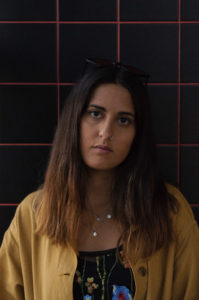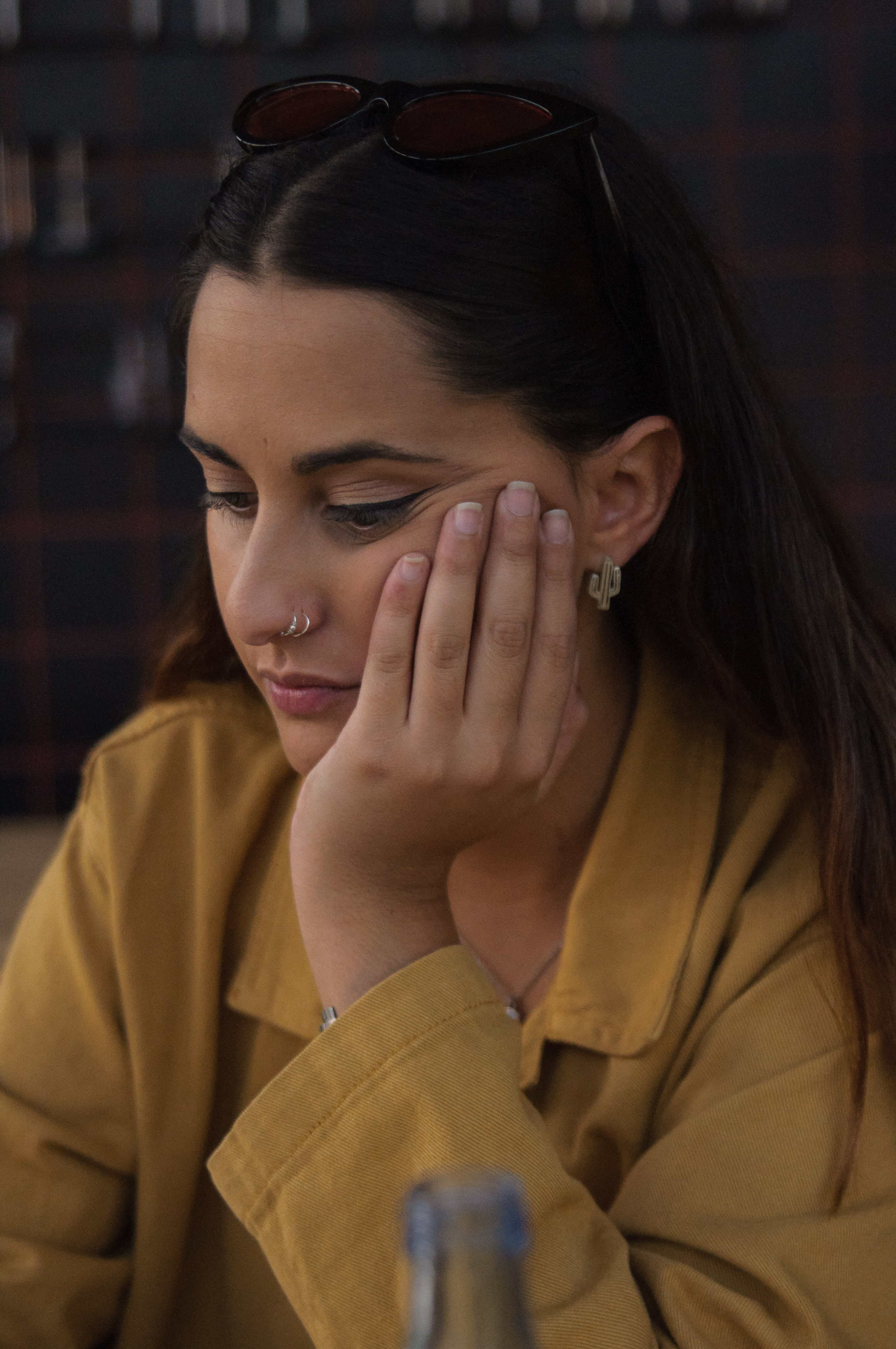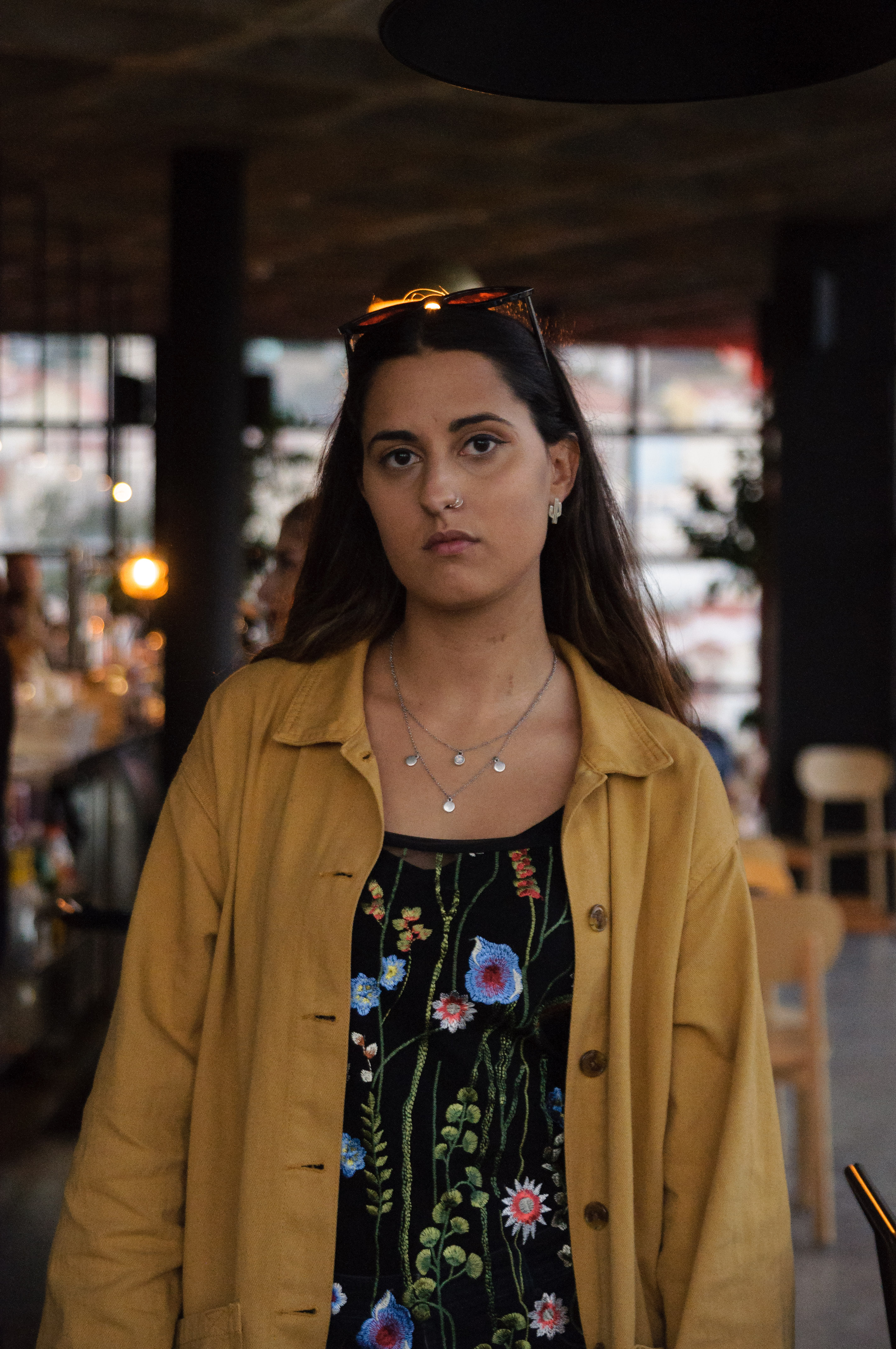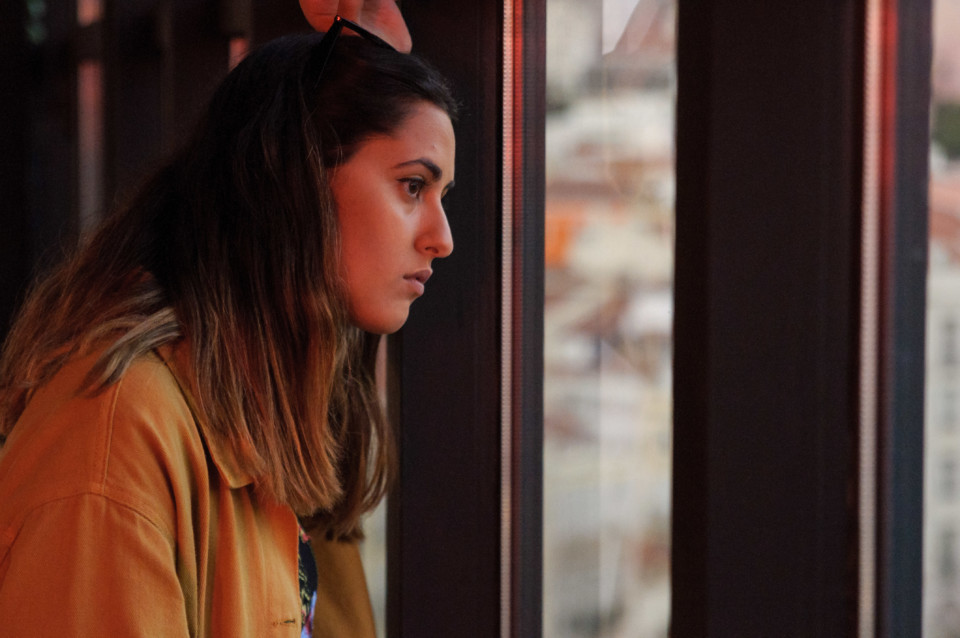A N A M A R T A
Lisbon | 2019

A N A M A R T A
City — Lisbon
Age — 21
Love life — Single
Profession — Master’s in Cinema & TV Journalism + Photographer of Comedians
Years in Lisbon — 1
Location — Rooftop bar Topo
T H E L I S B O N S T O R I E S
‘MOST PEOPLE
ARE DUMB.
LIKE VERY,
VERY STUPID’

- What is your best personality trait? “I always say that I’m lucky, because at 21, I’m doing what I love – photographing comedians and other interesting people – and making money out of it. Although my best friend said, ‘No, you’re not lucky, you create your own opportunities.’ I realised it’s true. I dive in head-first. I just go and never stop to think, ‘What if?’ or, ‘Maybe I shouldn’t’. If I want to interview or photograph a politician or a famous artist, I just go and talk to them. I’d rather regret it after the fact. And when I don’t feel confident, I just pretend I am. In Porto, where I come from, that confidence came naturally to me. But here in Lisbon it’s a bit tough, because no one knows me yet.”
- What makes you different than other people? “I’m not afraid of saying what I need to say, hearing what I need to hear and feeling what I need to feel. Whenever I’m sad and totally messed up about something, I cry my heart out, I’m not going to hide. I’ll call my friends, call my mother, and pour my heart out. Profession-wise, I think I’m unique because I’m the first journalist in Portugal who focuses on comedy. Portugal is a very sad country by default, that’s why we have fado music and the word saudade for nostalgia and sadness about missing a person, or a situation. But apparently we are not as sad as everybody thinks, because every year, four or five comedians sell out theatres all over the country. I was the first one who came up with the idea of following those artists in their personal lives and on stage. It’s very, very difficult to make a good comedy show. Comedians need to deconstruct everything people see on a daily basis but pay little attention to, and make it relatable, and sometimes uncomfortable.”
- What is your biggest struggle? “I am a very lucky person. I come from a middle class family with money, and I have a beautiful face. I never had any real problems in life, but I do struggle with my age. I pressure myself to do things quickly, because I realise I am going to die some day. I’m afraid I will look back later on, and realise I did so much stuff I shouldn’t have wasted time on. I need to sit down every now and then and say to myself, no, Ana Marta, you don’t need to do everything right now. Just prioritise and focus.”
- What is your biggest life lesson? “To not be afraid. To cry, to laugh out loud, to ask for help, to be open. No one really cares about anyone beside themselves anyhow, so no one is going to think shit about it. In Portuguese we have this expression that means, don’t be afraid to go down. Because if you don’t hit rock bottom, if you don’t feel the crash, you’ll never be able to get up gracefully and you’ll always have that unresolved thing in your life. But if you go down and resolve it, you’re good to go.
Of course this happened with my love life. I had my first and only broken heart when I was 20. I thought my life was going to be over. And I had seen friends going through the same thing, but I felt sadder than they ever seemed to. Why, I wondered? Then I understood: they had been hiding, crying at home alone, listening to music or whatever, and it took months or years to get over it. I solved mine within one month, because I cried my eyes out in front of everybody. If I went to the beach with my friends, and saw the beautiful sea, I cried.”

- What is your biggest disappointment? “This is going to sound so pretentious, but it’s that most people are dumb. Like very, very stupid. I realised this when I went to college. I expected all humanity and journalism courses to be filled with intelligent people who belonged to an intellectual elite. Unfortunately, that was not the case. I really don’t want to be the smartest person in the room all the time. It’s not about IQ – I suck at math, if they give me incorrect change, I won’t even notice. But I just wanted to meet people with life lessons to offer, people who read things and know things and can debate a subject. You don’t need to have read Sartre to discuss human existence. But if you can’t even discuss your purpose in life, what are you doing? Are you watching tv all day, what’s happening? You need to be more, live more! I’ve had to accept that 90% of people just want to watch trash tv and read about the same rooftop bars in the same stupid magazines.”
- What is the best thing that ever happened to you? “More than ten years ago I met my two best friends at school. Of all the people I’ve met since, only those two guys remained. And we are the best friends in the world. We call each other all the time. Each of us is very different, one is a philosopher and an economist, the other one a sports guy and I am the artist photographer, or whatever. My whole life would have been different without their support, I couldn’t have done most of the things I did if I hadn’t had them. If I’d have gone to that class one year later, I would have been surrounded by dumb people.”
- What is your biggest sadness? “There have been a few times when I fully understood that I don’t matter. No one does. We are all so insignificant. In a few thousand years everyone will have forgotten about us. One thing I panic about especially is the fact that life will continue to exist thousands of years after I’m gone. Are those buildings still going to be here? It makes me cry in my bed at night that I won’t be able to witness that.”
- What advice would you give to other women in Europe?
“Now I have to talk about something that really annoys me: men whistling or cat-calling in the streets. My advice is, do not take that shit. I don’t take that shit. I was a boxer for a very long time, so maybe I have a confidence in my physical abilities that most women do not have. I know the majority of women are afraid − and they should be, because the men who say dirty things to you at night are animals. But if you’re outside in the sun and people are watching, don’t let them speak to you like that. Instead tell them to shut up. If a guy says ‘nice eyes’ or ‘beautiful girl’, I’ll just go, ‘I know’, or ‘my boyfriend knows’. But if it’s something aggressive, I turn aggressive as well and tell him he is a motherfucker and needs to shut up before I call the police or take matters into my own hands. It’s beautiful to turn around with my very strong accent from Porto, they immediately back off. Women from Porto are tough, speak loud and don’t hold their heads down. We all sound like badasses, even when we’re not. Women from Lisbon are much more discreet, even in the way they dress. They are very polite and calm and they speak very softly, sometimes I even need to ask them to speak up! The men in Lisbon are much calmer and politer than in Porto as well. For months now, nothing has happened.” - What is your ultimate goal?
“To win an Oscar for Best Documentary, about something completely disruptive I discovered. That would be cool. At the same time, that would be too serious for me, I want to have fun.” - What is your biggest fear?
“That my parents won’t be proud of me. Although I’m not trying to achieve that, because if I wanted to make my dad proud, I should have become a dentist. But despite doing things that they don’t always understand, I want them to say to me in my fifties: that’s pretty cool. It’s important, because they gave me everything. Thousands and thousands of euros. I owe them so much. I have this fear that I won’t be able to give back to them.” - What can really hurt you?
“Being lonely. When I live in the city, surrounded by people, but no one calls me, no one invites me over, or calls me back. I’m really uncomfortable with this kind of rejection, because it would mean that no one thinks I’m interesting or fun enough to have a beer with. This happened once, I think.” - What does Lisbon mean to you?
“Porto is the biggest rival of Lisbon, so I learned to hate Lisbon. Then I came here and understood that the people here aren’t pricks, but cool, and that they like people from the North. Lisbon has something that’s really important to me – diversity. I don’t just want to know Portuguese people, I want to know that guy from Bangladesh as well. What I don’t like about Lisbon, is the politeness. Even though you can talk about sex or have a discussion about politics, it makes people uncomfortable. I don’t feel a deep love for Lisbon yet, but it does feel like my second home. It’s sunny and beautiful, there are lots of things to do, you have the best food in the world and you can smoke weed here. What else do you want?”
Photos by Luís Luz

